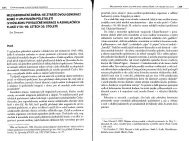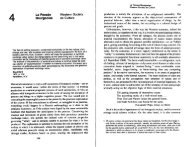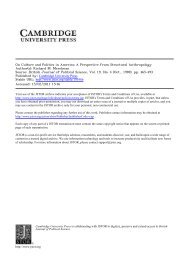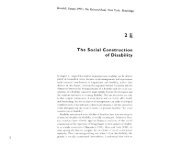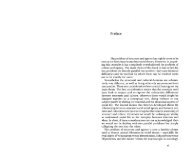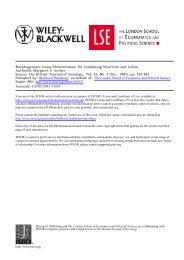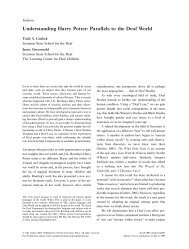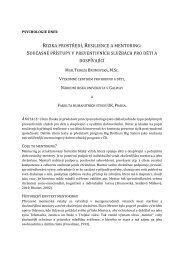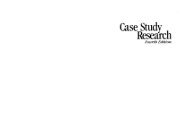Culture and Practical Reason Two Paradigms of ... - Moodle
Culture and Practical Reason Two Paradigms of ... - Moodle
Culture and Practical Reason Two Paradigms of ... - Moodle
- No tags were found...
You also want an ePaper? Increase the reach of your titles
YUMPU automatically turns print PDFs into web optimized ePapers that Google loves.
Chapter <strong>Two</strong> 64 <strong>Culture</strong> <strong>and</strong> <strong>Practical</strong> <strong>Reason</strong><strong>Two</strong> <strong>Paradigms</strong> <strong>of</strong> Anthropological Theory65entire cultural logic. For if, on one h<strong>and</strong>, the differences in linguistic valueeffect a particular decoupage <strong>of</strong> the external world, dividing it up accordingto certain principles, on the other h<strong>and</strong>, the elements so segregated areregrouped by meaningful correspondences between them. Here I speak notmerely <strong>of</strong> semantic distinctions but <strong>of</strong> cultural propositions. And the symbolicarbitrariness <strong>of</strong> the latter is even greater than that <strong>of</strong> the fonner. Atleast in theory there are natural limits on the semantic field <strong>of</strong> a singlelexeme: no single word, for example, is likely to signify, simultaneously<strong>and</strong> exclusively. the two species cattle <strong>and</strong> lobster. But the same examplewill suggest to Americans, among whom the peculiar combination "steak<strong>and</strong> lobster" is a definite category <strong>of</strong>dining, that culture is not under a likeconstraint. There appear to be no theoretical limits assignable a priori as towhat will be classed with what else in the cultural scheme. "A relative bymarriage is an elephant's hip." The propositional logic is marvelouslyvaried <strong>and</strong> so, even within this one <strong>and</strong> the same world, are the cultures. 8In brief, by symbolic valuation <strong>and</strong> synthesis <strong>of</strong> the objective reality, wecreate a new kind <strong>of</strong> object, with distinct properties: culture. Language is aprivileged means <strong>of</strong> this project. But for Morgan, language is no more thanperception articulate. Hence the passage from nature to culture in Morgan'sview is no more momentous than, say, the reduction <strong>of</strong> the Odysseyfrom the spoken fonn to writing. As a leading Marxist recently wrote <strong>of</strong>Kautsky, so it can be said <strong>of</strong> Morgan that for him "human history ... is anappendage <strong>of</strong> natural history, its law <strong>of</strong> motion merely fonns <strong>of</strong>appearance<strong>of</strong> biological laws" (Schmidt 1971, p. 47).9I'instrument Ie plus important etle plus precieux pour la conquete et pour la constructiond'un vrai monde d'objets" (Cassirer 1933, p. 23).For a fine anthropological discussion <strong>of</strong> the cultural relativity <strong>of</strong> the distinction betweenbelief <strong>and</strong> experience, a distinction peculiar to those Western societies which undertakethe anthropology <strong>of</strong> others, see Needham 1972 (especially p. 173).8. In the same sense <strong>of</strong> a cultural construction, one may note <strong>of</strong> Saussure's sheep/mullonthat this animal takes its place in the Anglo-Saxon world as fit for butchery alongsidepigs <strong>and</strong> callie, which share a parallel declension <strong>of</strong> terms for the prepared state (pork,beef), while all differ in this respect from horses <strong>and</strong> dogs. History without structurewould not seem to explain the classification, since we have no Norman-inspired word for"cheval" by analogy to mUllon, beef, <strong>and</strong> pork. In chapter 4, I discuss the logic <strong>of</strong>edibility/inedibility in the American scheme (pp. 170-79).9. I am indebted to Pr<strong>of</strong>essor Paul Kay for most helpful discussion <strong>of</strong> the problem <strong>of</strong> the"arbitrariness <strong>of</strong> the sign." My indebtedness extends even to certain phrases which arehis-as any errors or misconceptions remain mine. Among the errors I would avoid is theclaim <strong>of</strong> an extreme linguistic relativism. I do not mean to suggest that thought mustcoincide with the grammatical distinctions <strong>of</strong> a given language. The whole idea seems toBoasAgainst this background, Boas's odyssey "from physics to ethnology"becomes significant as founding an opposition within which anthropologyhas cycled these many years. As George Stocking (1968) so welI describesit, that was a journey <strong>of</strong> many years in which Boas passed from a monisticmaterialism to the discovery that''the seeing eye is the organ <strong>of</strong> tradition";a journey <strong>of</strong> many stages in which he discovered that for man the organicdoes not foIlow from the inorganic, the subjective from the objective, themind from the world-<strong>and</strong>, in the end, culture from nature. The first stepswere taken within physics itself. In his dissertation on the color <strong>of</strong> seawater,Boas remarked on the difficulty <strong>of</strong> detennining the relative intensities<strong>of</strong> lights that differed slightly in color. Quantitative variation in theobject did not evoke corresponding variation in the subject. lo Boas waslater to repeat the experience on the linguistic level, when with NorthwestCoast infonnants he discovered that sounds considered the same by a. speaker <strong>of</strong> one language might be heard as completely different by speakers<strong>of</strong> another, <strong>and</strong> vice versa, as each perceived in the discourse <strong>of</strong> theother the distinctions appropriate to his own. 11 Between times he passednaturalIy through a phase <strong>of</strong> Fechnerian psychophysics that had the sameimport: sensory experiments in threshold phenomena which not only reiteratedthe conclusion that objective differences in stimuli engendered noparalIel differentiation <strong>of</strong> response-that the human reaction to quantitywas itself qualitative-but also that the response depended on situationalfactors <strong>and</strong> the person's mental set. Perception in the human subject isapperception; it depends, one might say, on the mental tradition. But thatitself is not decisive, not unique to man. For any given human group, theimply a suspension <strong>of</strong> the symbolic powers necessary to its postulation. There .i,s alsosome evidence that inner speech, which is "a distinct plane <strong>of</strong> ve~bal ~hought, has adifferent <strong>and</strong> more simplified structure than spoken language; nor IS thiS yet the mostpr<strong>of</strong>ound level <strong>of</strong> a complex. <strong>and</strong> largely unknown. relation between thought <strong>and</strong> word(Vygotsky 1962).10. "In preparing my doctor'S thesis I had to use p~ot~metric methods to ~ompare inlensities<strong>of</strong> light. This led me to consider the quantitative values <strong>of</strong> sens~tlons. In the .course <strong>of</strong> my investigation I learned to recognize that there are domams <strong>of</strong> our eXPc:r1ence in which the concepts <strong>of</strong> quantity. <strong>of</strong> measures that can be added or subtracted likethose with which I was accustomed to operate. are not applicable" (Boas [1938J inStocking 1974, p. 42).II "The alternation <strong>of</strong> the sounds is clearly an effect <strong>of</strong> perception through the medium <strong>of</strong>. a foreign system <strong>of</strong> phonetics" (Boas 1966a( 1911 I. p. 14; cf. Stocking 1974. pp. 72 ff.).



